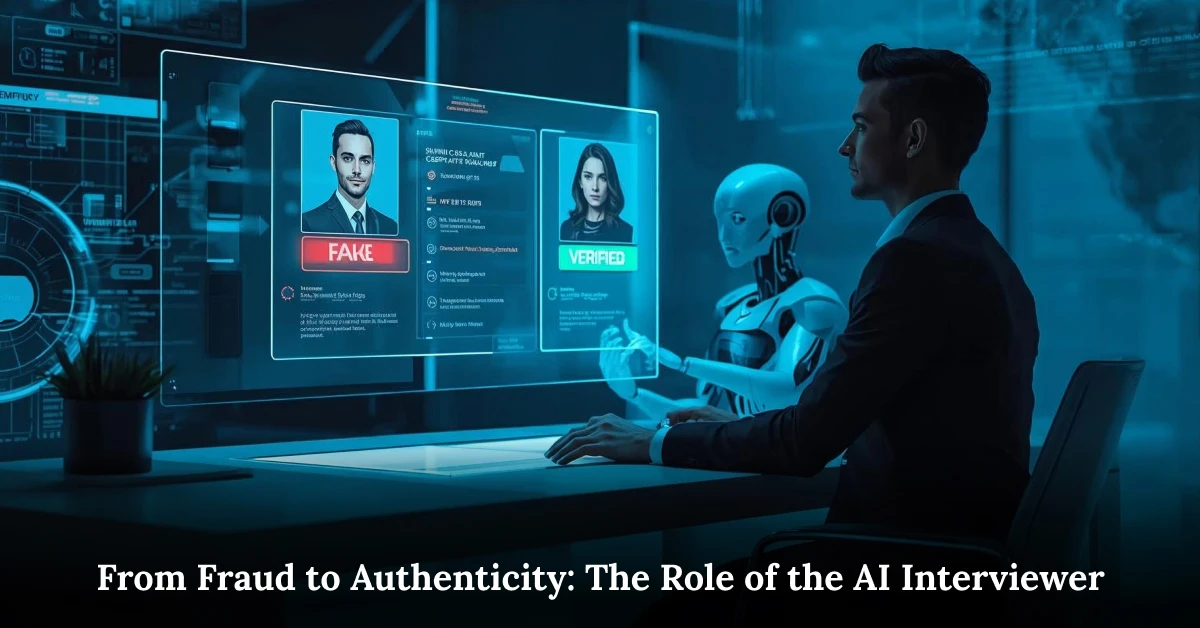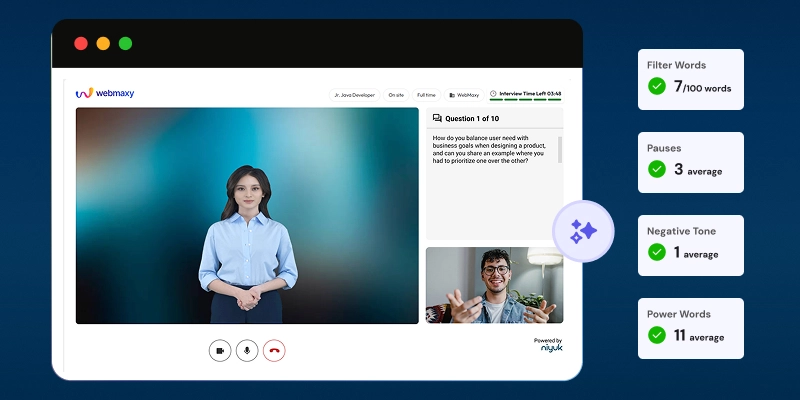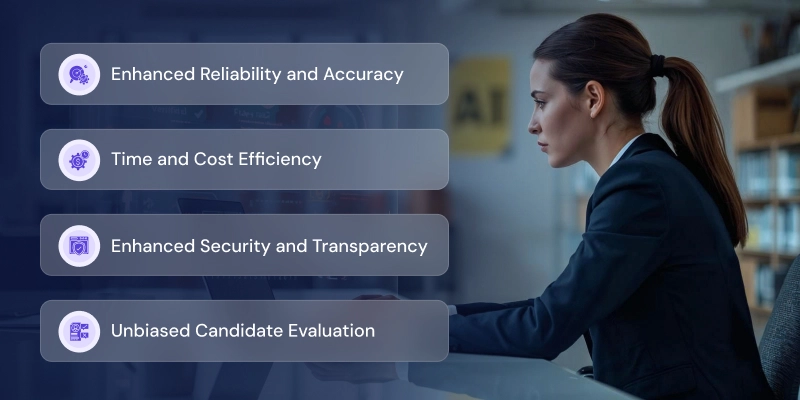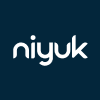From Fraud to Authenticity: The Role of the AI Interviewer

Fake Candidates and Authenticity issues are the real uneven faced by Hr and recruitment people today. Businesses loose almost 30% of the cost of their first year’s income due to wrong hiring or bad hiring. This issue happens due to wrong information provided by candidates about their skills, experience or identity. This not only damages with extra expenses on hiring and recruitment, forcing for litigation also in many cases. This tarnishes your company image, as well. AI Interviewer is the real solution here.
Fake candidates do proxy identifications or representations, deepfake and voice manipulations. Interviewer AI is the remedy over all these practices.
In today’s AI era, many techniques have evolved, with which companies can cope up with these bottlenecks. Advanced AI- based fraud detection systems using voice biometrics and prompt behavioural analysis to strengthen hiring process.
Existing Position of AI Recruitment Tools
AI- driven recruitment systems have shorten hiring time by maximum 70%. Above all, 86% of recruiters are experiencing of improved efficiency with AI-driven solutions.
AI recruitment tools improve 2 main functions. 70% of companies apply AI to write job descriptions and their marketing emails. Also, 70% of companies apply AI for scheduling interviews.
NLP has really transformed these systems’ capabilities. Latest AI tools analyse unstructured data collected from various sources like phone calls, interviews, resumes, cover letters, and social media profiles and learn and adapt and enhance their replies on basis of various inputs of data to improve their outcomes other than regular automation.
The future is prospective. As per sources, 67% of HR professionals experienced a positive impact of AI in hiring process. AI powered recruitment is the new upcoming trend today.
With Ai, we can reduce the bias and focus on real things like skills and certifications rather than demographical data. These AI recruitment tools do everything. They reply to simple questions through chatbots to conduct real interview screenings. AI tools for hiring have many proven benefits.
In the next section, let us see how AI technology detects fake candidates.
Detection of Fake Candidates via AI
The foundation of modern recruitment fraud detection is Machine learning algorithms. These efficient systems analyse patterns and predict threats faster and adapting to new deceptive tactics.
The big issue arises with those candidates, who have used AI to generate their resumes. Nearly 42% of companies use AI tools to detect such fraudulent applicant’s source.
These systems spot out common red flags like keyword stuffing, uneven formatting, and AI-generated content markers in resumes.
AI detection systems work more sophisticatedly for interviews. They can easily identify mismatched voice-to-mouth movements and managed responses from out of-screen sources.
This technology is certainly valuable when detecting deepfake attempts, where during interviews fraudster candidates manipulate their voice or appearance during virtual interviews.
Machine learning has improved a lot in background verification task. AI systems check educational qualifications and employment histories at a time, on a larger scale. This makes the scrutiny (verification check) process faster and very useful in case of large-scale hiring camps.
All these systems mainly depend upon predictive models built from earlier fraud cases to find out subtle deception signs. Even, they utilize modern tools to restrict automated mass applications, making sure that only quality candidates move ahead to the starting round.
Ongoing background checks provide an additional layer of security.
Latest Voice and Video Analysis: for Candidate Authenticity with AI Powered Hiring

AI-powered voice and facial analysis tools are really transforming modern recruitment scenario. As per the latest research, 76% of companies are going to use AI for interview questions by 2025, and 63% companies are planning to get facial recognition data.
Now, AI recruitment platforms analyse candidate interactions in various ways.
They use data on voice patterns, intonation, and body language to check authenticity. Smart algorithms may detect small changes in eye movements, jaw movements and mouth positions that might reveal impersonation attempts.
Voice analysis has developed now, beyond simple authentication. AI systems track speech patterns, tone variations, and natural pauses which could indicate fraud. 86% of candidates are in favour of attaining AI voice interviews over conventional video or chat-based assessments.
Many platforms have empowered their verification processes by joining ID checks with social profile validations on sites like LinkedIn, GitHub, and GitLab.
This 2-step process has remarkably declined candidate imitation risks.
Key indicators these technologies check include:
- Speech patterns and voice consistency across multiple interactions
- Authentic replies versus AI-generated or scripted answers
- Natural eye movement and the screen engagement
Apart from basic screening, such systems offer deeper insights into candidate authenticity by locating unnatural eye movements or voice patterns giving signal fraud.
The industry is regularly evolving its approach with latest analysis tools which create a more secure, efficient hiring process. Companies may verify candidates now with more confidence making sure for a positive experience.
AI Screener leverages advanced technologies like computer vision to offer trustworthy remote proctoring features, making sure for a smooth, secure interview experience.
Key features are:
- AI-powered Recruitment: The platform uses AI resumes screening, conduct automated video interviews and analyse candidate performance.
- Mass Recruitment: It is designed to smartly screen, interview, and shortlist many candidates.
- Avoid Bias in Hiring: The tools aim to drop down human bias by offering structured evaluations and data-driven reports.
- Tailored Assessments: It offers over 100 pre-built assessments for various job roles and allows for customization.
- Time & Cost Savings: By automating early-stage interviews and candidate screening, it saves significant time and resources of companies, using it.
Niyuk.AI’s platform is available online and aims to simplify the hiring process for businesses of all sizes, from startups to large enterprises.
Benefits of Using AI Interviewers for Authentic Hiring

Using AI to detect fake candidates presents several important benefits:
- Enhanced Reliability and Accuracy: AI lowers manual error, offering correct insights across candidate’s skill and candidate authenticity.
- Time and Cost Efficiency: AI screening primarily drops resource costs, permitting the recruiters to work on strategic tasks.
- Enhanced Security and Transparency: AI allows secure identity verification, limiting risks relative with fraud identity claims.
- Unbiased Candidate Evaluation: Automated processes support companies meeting diverse goals by removing unconscious human bias.
Limitations and Ethical Considerations of AI Interviewers
AI technology has its limitations and ethical concerns which should be considered:
- AI Bias and Fairness: Some algorithms biased training data, mainly leading to unfair hiring decisions. Organizations should ensure fairness via careful AI model building and testing.
- Data Privacy Concerns: Securing sensitive candidate data is important or crucial, and companies must adhere to -privacy laws, ethics guidelines.
- Human Oversight Integration: AI should support human intuition and decision-making, instead of replacement, to assure about delicate or elusive perspectives in tough hiring conditions.
Key Practices for Ethical AI in Recruitment
To sustain ethical standards, organizations should come over the basic checks.
Here are some critical practices:
- Regular Monitoring and Testing: Companies must frequent audit their AI screener tools for fairness. This will simply help to see if minor changes in a resume (such as a name) unfairly alter a candidate’s score.
- Explainable AI and Transparency: AI screener tool must offer detailed dashboards in place of a black box, which will elaborate the logic for showing a candidate’s score, highlighting the specific skills and will prefer for the recommendation
- Data Governance and Privacy: Strict guidelines must be there to handle data responsibly. This includes taking personal data from training sets and adhering to changing data protection laws to safeguard candidate information.
- A Focus on Skills-Based Hiring: To fight with bias inherent in conventional resume data, various AI screener platforms are designed to prefer a candidate’s skills and competencies over their background or past job titles. This supports companies to identify a more dynamic talent pool.
Human decision remains very important part of the recruitment in 2025. Also, interviews by ai process data smartly, it cannot match human insight for cultural fit and people skills. HR teams must learn new skills to understand and use AI screener for Interviews generated information efficiently.
The future of recruitment is not regarding Ai replacing humans, but for a useful relation where AI in Recruitment boosts human capabilities, enabling recruiters to create fast, fair and more informed hiring decisions.
AI vs. Traditional Methods: Detecting Fraud and Authenticity
This data –defining table compares key metrics and capabilities of AI-driven recruitment tools verses conventional manual processes, portraying their effectiveness in fighting fraud and making sure for candidate authenticity.
|
Metric / Capability |
AI-Powered Screening |
Traditional Manual Screening |
|
Fraud Detection |
High: Detects data irregularities, resume fraud detections (more than 70% reduction), and indicates deepfakes/voice manipulation (95% or more accuracy). |
Low: Relies on manual checks and human intuition; highly influenced to hi-class fraud. |
|
Bias Mitigation |
High: Assess candidates on objective skills and qualifications, tends to a more diverse talent pool (up to 16% rise in diversity). |
Low: Prone to human unconscious bias on the basis of names, schools, or backgrounds. |
|
Time to Screen |
Extremely Fast: Screens many profiles in minutes, reduces the time-to-hire by over 20%. |
Very Slow: Manually sifting via resumes can take hours or also days per role. |
|
Data Sources Analyzed |
Comprehensive: Analyses non-structured data from resumes, interview transcripts, voice tones, and video. |
Limited: Basically, depends on resume text, notes from initial phone screens. |
|
Candidate Authenticity |
High: Checks behavioural patterns and linguistic analysis to detect pre-rehearsed or inauthentic responses. |
Subjective: Authenticity is based on a recruiter’s personal judgment and experience. |
|
Cost Efficiency |
High: Remarkable decline in cost-per-hire by automating early-stage screening and reducing administrative workload. |
Low: Labor-intensive process with a higher hourly cost for recruiters. |
The Future of AI in Recruitment
Companies must be transparent about their AI driven hiring processes. They must brief how Modern AI tools review candidates and secure permission to use data. Removing Personally Identifiable Information from AI recruitment tools is necessary to prevent bias because of gender, race, or location.
Beyond removing PII, leading companies like Eightfold.ai mainly focus on one thing that, responsible AI in hiring needs regular monitoring and external audits to make sure that, algorithms are not retaining historical hiring biases.
The goal is to develop “explainable AI” systems showing influencing factors on a candidate’s score.
Recruiters are combining now, AI-informed decisions with human judgment. While AI hiring tools handle tasks – resume screening and interview scheduling, HR professionals can entrust on building relationships and checking for cultural fit within organizations. This mixed approach is about using AI in Recruitment to upgrade efficiency while retaining or sustaining the “human touch.”
For example, companies like HireVue use AI interviews to validate skills and automate workflows. This free up recruiter to focus on high-value interactions like arranging final-round interviews.
Niyuk’s remote proctoring system is made to withstand the integrity of the assessment process and offering flexibility for – candidates and employers.
Conclusion
As discussed in all above sections here, AI recruitment tools have redesigned how companies detect and restrict interview fraud. These latest systems find out deceptive practices via multiple verification layers right from voice analysis to behavioural pattern detection.
While AI checks and handles the technical screening factors, human judgment remains critical for final hiring decisions.
The best results are acquired when companies implement AI recruitment tools with transparency. AI allows recruiters to create well-informed decisions based on verified candidate data without changing human insight. This blend of technology and human talent makes a more secure, efficient hiring process.
Modern recruitment grows on maintaining the right balance. AI excels in fraud detection and data processing, while recruiters offer essential expertise in evaluating cultural fit and interpersonal skills. They secure organizations from fake candidates and make sure that real talent doesn’t go unnoticed.
For availing these modern technology and unmatched benefits, you can contact our Niyuk team at the earliest for each detail by mail on: info@niyuk.ai
Frequently Asked Questions
1. How can AI interviewers detect fake identities?
AI interviewers detect fake identities with a multi-layered approach, aligning biometric authentication, like facial recognition and liveness detection, to crosscheck a candidate’s physical presence.
2. Can AI detect if candidates are using AI tools to answer questions?
AI can detect some examples of AI tool usage by candidates, especially with written materials, but detection is not certain and can be unreliable for oral responses.
3. Does using AI to detect fake candidates improve hiring quality?
Using AI to find fake candidates improves hiring quality by excelling speed and scale, assured consistency, and reducing human error in vetting candidates, thereby preventing malfunctioned experiences, impersonation, and other risks.
